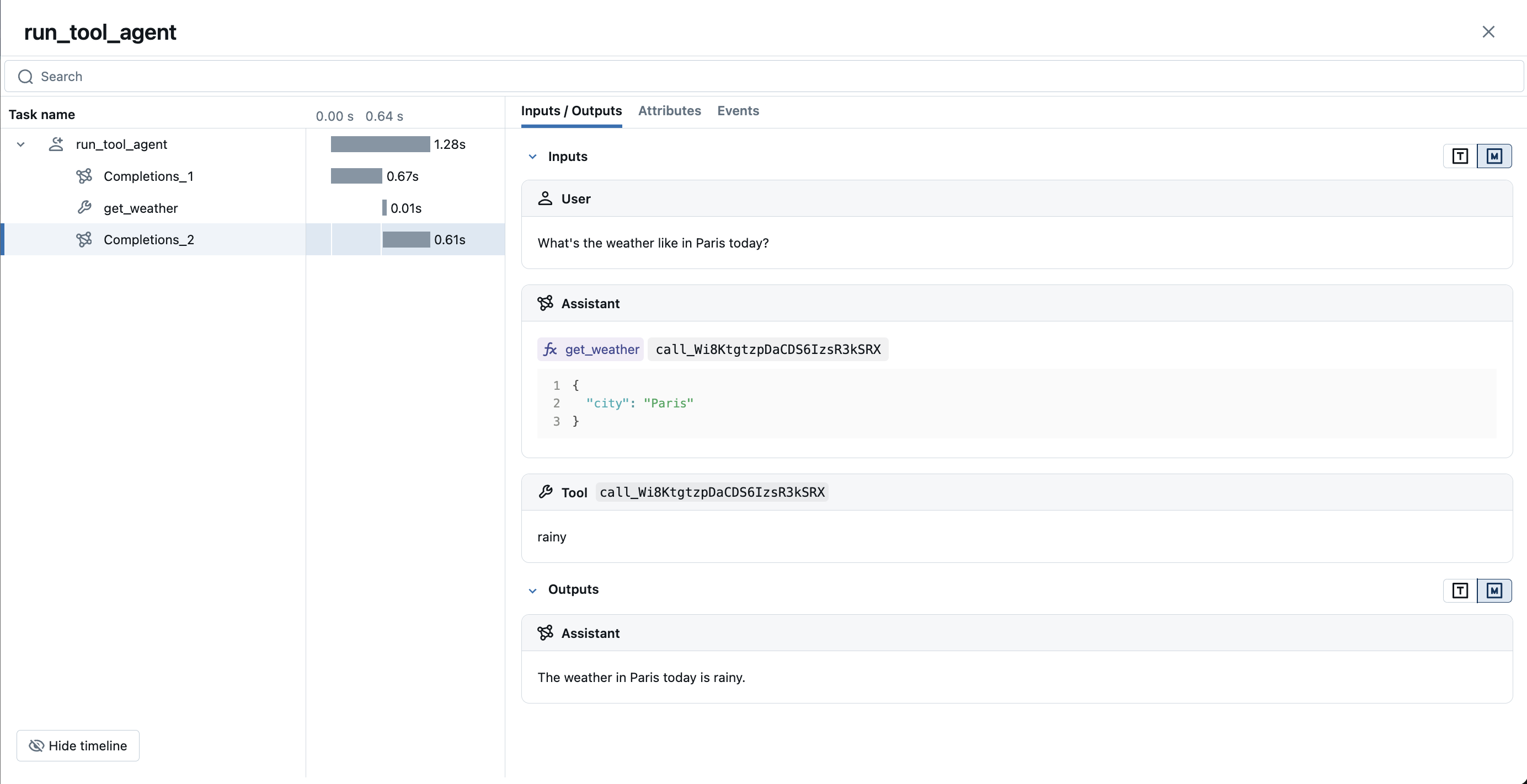跟踪 OpenAI

MLflow 跟踪 为 OpenAI 提供了自动跟踪功能。通过调用 mlflow.openai.autolog() 函数启用 OpenAI 的自动跟踪,MLflow 将捕获 LLM 调用轨迹并将其记录到当前活跃的 MLflow 实验中。
import mlflow
mlflow.openai.autolog()
MLflow 跟踪自动捕获关于 OpenAI 调用的以下信息
- 提示和完成响应
- 延迟
- 模型名称
- 附加元数据,例如
temperature,max_tokens, 如果指定。 - 如果在响应中返回的函数调用
- 内置工具,例如网络搜索、文件搜索、计算机使用等。
- 如果引发的任何异常
MLflow OpenAI 集成不仅限于跟踪。MLflow 为 OpenAI 提供了完整的跟踪体验,包括模型跟踪、提示管理和评估。请查看 MLflow OpenAI Flavor 以了解更多信息!
支持的 API
MLflow 支持对以下 OpenAI API 进行自动跟踪。要请求对其他 API 的支持,请在 GitHub 上提交 功能请求。
聊天补全 API
| 普通 | 函数调用 | 结构化输出 | 流式传输 | 异步 | 图像 | 音频 |
|---|---|---|---|---|---|---|
| ✅ | ✅ | ✅(>=2.21.0) | ✅ (>=2.15.0) | ✅(>=2.21.0) | - | - |
响应 API
| 普通 | 函数调用 | 结构化输出 | 网络搜索 | 文件搜索 | 计算机使用 | 推理 | 流式传输 | 异步 | 图像 |
|---|---|---|---|---|---|---|---|---|---|
| ✅ | ✅ | ✅ | ✅ | ✅ | ✅ | ✅ | ✅ | ✅ | - |
响应 API 从 MLflow 2.22.0 开始支持。
代理 SDK
参见 OpenAI 代理 SDK 跟踪 获取更多详细信息。
嵌入 API
| 普通 | 异步 |
|---|---|
| ✅ | ✅ |
基本示例
- 聊天补全 API
- 响应 API
import openai
import mlflow
# Enable auto-tracing for OpenAI
mlflow.openai.autolog()
# Optional: Set a tracking URI and an experiment
mlflow.set_tracking_uri("https://:5000")
mlflow.set_experiment("OpenAI")
openai_client = openai.OpenAI()
messages = [
{
"role": "user",
"content": "What is the capital of France?",
}
]
response = openai_client.chat.completions.create(
model="gpt-4o-mini",
messages=messages,
temperature=0.1,
max_tokens=100,
)
import openai
import mlflow
# Enable auto-tracing for OpenAI
mlflow.openai.autolog()
# Optional: Set a tracking URI and an experiment
mlflow.set_tracking_uri("https://:5000")
mlflow.set_experiment("OpenAI")
openai_client = openai.OpenAI()
response = client.responses.create(
model="gpt-4o-mini", input="What is the capital of France?"
)
流式传输
MLflow 跟踪支持 OpenAI SDK 的流式传输 API。通过相同的自动跟踪设置,MLflow 自动跟踪流式传输响应并在跨度 UI 中渲染连接后的输出。响应流中的实际块也可在 Event 选项卡中找到。
- 聊天补全 API
- 响应 API
import openai
import mlflow
# Enable trace logging
mlflow.openai.autolog()
client = openai.OpenAI()
stream = client.chat.completions.create(
model="gpt-4o-mini",
messages=[
{"role": "user", "content": "How fast would a glass of water freeze on Titan?"}
],
stream=True, # Enable streaming response
)
for chunk in stream:
print(chunk.choices[0].delta.content or "", end="")
import openai
import mlflow
# Enable trace logging
mlflow.openai.autolog()
client = openai.OpenAI()
stream = client.responses.create(
model="gpt-4o-mini",
input="How fast would a glass of water freeze on Titan?",
stream=True, # Enable streaming response
)
for event in stream:
print(event)
异步
MLflow 跟踪从 MLflow 2.21.0 版本开始支持 OpenAI SDK 的异步 API。用法与同步 API 相同。
- 聊天补全 API
- 响应 API
import openai
# Enable trace logging
mlflow.openai.autolog()
client = openai.AsyncOpenAI()
response = await client.chat.completions.create(
model="gpt-4o-mini",
messages=[
{"role": "user", "content": "How fast would a glass of water freeze on Titan?"}
],
# Async streaming is also supported
# stream=True
)
import openai
# Enable trace logging
mlflow.openai.autolog()
client = openai.AsyncOpenAI()
response = await client.responses.create(
model="gpt-4o-mini", input="How fast would a glass of water freeze on Titan?"
)
函数调用
MLflow 跟踪自动捕获 OpenAI 模型返回的函数调用响应。响应中的函数指令将在跟踪 UI 中高亮显示。此外,您可以使用 @mlflow.trace 装饰器注解工具函数,以便为工具执行创建跨度。

以下示例演示了如何使用 OpenAI 函数调用和 MLflow 对 OpenAI 的跟踪来实现一个简单的函数调用代理。
- 聊天补全 API
- 响应 API
import json
from openai import OpenAI
import mlflow
from mlflow.entities import SpanType
client = OpenAI()
# Define the tool function. Decorate it with `@mlflow.trace` to create a span for its execution.
@mlflow.trace(span_type=SpanType.TOOL)
def get_weather(city: str) -> str:
if city == "Tokyo":
return "sunny"
elif city == "Paris":
return "rainy"
return "unknown"
tools = [
{
"type": "function",
"function": {
"name": "get_weather",
"parameters": {
"type": "object",
"properties": {"city": {"type": "string"}},
},
},
}
]
_tool_functions = {"get_weather": get_weather}
# Define a simple tool calling agent
@mlflow.trace(span_type=SpanType.AGENT)
def run_tool_agent(question: str):
messages = [{"role": "user", "content": question}]
# Invoke the model with the given question and available tools
response = client.chat.completions.create(
model="gpt-4o-mini",
messages=messages,
tools=tools,
)
ai_msg = response.choices[0].message
messages.append(ai_msg)
# If the model request tool call(s), invoke the function with the specified arguments
if tool_calls := ai_msg.tool_calls:
for tool_call in tool_calls:
function_name = tool_call.function.name
if tool_func := _tool_functions.get(function_name):
args = json.loads(tool_call.function.arguments)
tool_result = tool_func(**args)
else:
raise RuntimeError("An invalid tool is returned from the assistant!")
messages.append(
{
"role": "tool",
"tool_call_id": tool_call.id,
"content": tool_result,
}
)
# Sent the tool results to the model and get a new response
response = client.chat.completions.create(
model="gpt-4o-mini", messages=messages
)
return response.choices[0].message.content
# Run the tool calling agent
question = "What's the weather like in Paris today?"
answer = run_tool_agent(question)
import json
import requests
from openai import OpenAI
import mlflow
from mlflow.entities import SpanType
client = OpenAI()
# Define the tool function. Decorate it with `@mlflow.trace` to create a span for its execution.
@mlflow.trace(span_type=SpanType.TOOL)
def get_weather(latitude, longitude):
response = requests.get(
f"https://api.open-meteo.com/v1/forecast?latitude={latitude}&longitude={longitude}¤t=temperature_2m,wind_speed_10m&hourly=temperature_2m,relative_humidity_2m,wind_speed_10m"
)
data = response.json()
return data["current"]["temperature_2m"]
tools = [
{
"type": "function",
"name": "get_weather",
"description": "Get current temperature for provided coordinates in celsius.",
"parameters": {
"type": "object",
"properties": {
"latitude": {"type": "number"},
"longitude": {"type": "number"},
},
"required": ["latitude", "longitude"],
"additionalProperties": False,
},
"strict": True,
}
]
# Define a simple tool calling agent
@mlflow.trace(span_type=SpanType.AGENT)
def run_tool_agent(question: str):
messages = [{"role": "user", "content": question}]
# Invoke the model with the given question and available tools
response = client.responses.create(
model="gpt-4o-mini",
input=question,
tools=tools,
)
# Invoke the function with the specified arguments
tool_call = response.output[0]
args = json.loads(tool_call.arguments)
result = get_weather(args["latitude"], args["longitude"])
# Sent the tool results to the model and get a new response
messages.append(tool_call)
messages.append(
{
"type": "function_call_output",
"call_id": tool_call.call_id,
"output": str(result),
}
)
response = client.responses.create(
model="gpt-4o-mini",
input=input_messages,
tools=tools,
)
return response.output[0].content[0].text
# Run the tool calling agent
question = "What's the weather like in Paris today?"
answer = run_tool_agent(question)
禁用自动跟踪
可以通过调用 mlflow.openai.autolog(disable=True) 或 mlflow.autolog(disable=True) 全局禁用 OpenAI 的自动跟踪。